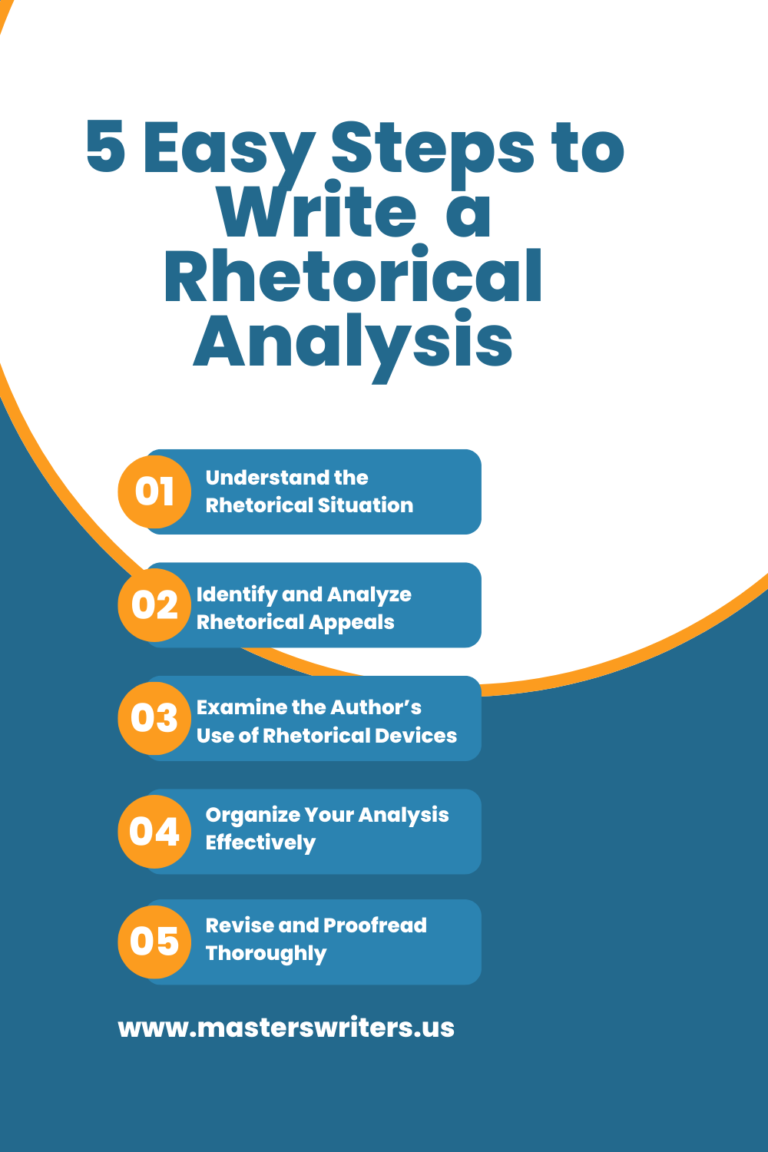Essay Writing Guides
How to Write A Rhetorical Analysis Essay-Examples & Tips


Rhetorical analysis examines how authors or speakers use language and rhetorical techniques to persuade, inform, or entertain their audience. Rhetorical analysis helps us understand the effectiveness of communication and the underlying messages conveyed by dissecting the strategies and methods employed in a text. This critical examination can be applied to various forms of communication, including speeches, articles, advertisements, and literary works, providing deeper insights into how language influences and shapes public perception.
In this comprehensive guide, we will explore the process of conducting a rhetorical analysis and writing a rhetorical analysis essay. We will cover key rhetorical concepts and the three primary rhetorical appeals—ethos, pathos, and logos. Additionally, we will provide practical tips and an outline to help you structure your analysis effectively. Understanding and applying these principles allows you to write compelling rhetorical analyses revealing persuasive communication’s intricacies.
What is A Rhetorical Analysis Essay?
A rhetorical analysis essay is a type of academic writing that examines how an author or speaker uses language and rhetorical techniques to influence, persuade, or engage their audience. Unlike a summary, which recounts the content of a text, a rhetorical analysis dissects the strategies and methods employed to convey the message and achieve the desired effect. This involves analyzing the use of ethos (credibility), pathos (emotional appeal), and logos (logical argument) to understand how the author builds their argument and connects with the audience.
In a rhetorical analysis essay, you are tasked with identifying these rhetorical devices and evaluating their effectiveness in the text context. This requires a critical examination of the choices made by the author, including word choice, tone, imagery, and structure. The goal is to uncover the techniques that make the text persuasive or impactful, providing a deeper understanding of communication. This type of essay enhances your analytical skills and appreciation of the subtleties of language and argumentation.

Do You Want to Ease Your Academic Burden?
Order a rhetorical analysis essay from our expert writers today and experience the power of top-notch academic writing.
Key Rhetorical Concepts
Understanding key rhetorical concepts is essential for analyzing how texts influence audiences. These concepts encompass authors’ and speakers’ strategies and techniques to craft their messages. Central to rhetorical analysis are the three rhetorical appeals: ethos, pathos, and logos. These appeals represent different methods of persuasion and are foundational elements in the study of rhetoric. By examining how each appeal is employed, you can gain insights into the effectiveness of the communication and how it seeks to persuade its audience.
Rhetorical Appeals
Rhetorical appeal #1: Ethos
Ethos refers to the credibility and ethical appeal of the author or speaker. It involves convincing the audience of the communicator’s reliability, authority, and character. Ethos is established through the speaker’s expertise, knowledge, and trustworthiness. For instance, a doctor writing about health issues would naturally have a strong ethos due to their medical background. Ethos can also be conveyed through tone, style, and credible sources, contributing to the author’s or speaker’s authority and integrity.
Rhetorical appeal #2: Pathos
Pathos is the emotional appeal used to persuade the audience by evoking feelings. This appeal aims to connect with the audience emotionally, using language, stories, and images that elicit emotions such as pity, anger, joy, or fear. Pathos is often achieved through vivid descriptions, personal anecdotes, and expressive language that stir the audience’s emotions and create a bond between the speaker and the audience. For example, a charity organization might use images of distressed people to appeal to the audience’s compassion and encourage donations.
Rhetorical appeal #3: Logos
Logos refers to logical appeal, using reason and evidence to persuade the audience. This appeal relies on presenting clear, logical arguments supported by facts, statistics, and rational explanations. Logos is effective because it appeals to the audience’s intellect and sense of reason. A well-constructed argument that follows logical principles and is backed by solid evidence can be highly persuasive. For instance, a politician advocating for policy changes might use statistical data to demonstrate the effectiveness of their proposed solutions.
Understanding and identifying these rhetorical appeals allows you to analyze how authors and speakers construct their arguments and persuade their audiences. This knowledge is crucial for conducting a thorough and insightful rhetorical analysis.
5 Tips on How to Write a Rhetorical Analysis

- Understand the Rhetorical Situation
- Before diving into your analysis, take time to understand the rhetorical situation, which includes the author, the audience, the purpose, and the context of the text. Knowing these elements will help you comprehend why the author chose specific rhetorical strategies and how they aim to influence their audience. Consider questions such as: Who is the author? What is the intended audience? What is the purpose of the text? What is the context in which it was created?
- Identify and Analyze Rhetorical Appeals
- Focus on identifying the three main rhetorical appeals: ethos, pathos, and logos. Look for specific examples in the text where the author establishes credibility (ethos), appeals to emotions (pathos), and uses logical reasoning (logos). Analyze how effectively these appeals are used and how they contribute to the overall argument. Provide concrete examples from the text and explain their significance in persuading the audience.
- Examine the Author’s Use of Rhetorical Devices
- Pay attention to the author’s rhetorical devices and strategies, such as imagery, metaphor, repetition, and tone. Analyze how these devices enhance the author’s message and impact the audience. For example, if the author uses vivid imagery, consider how it helps to create an emotional response or clarify complex ideas. Discuss the purpose of these rhetorical choices and how they support the author’s argument.
- Organize Your Analysis Effectively
- Structure your rhetorical analysis essay clearly and logically. Start with an introduction that provides background information on the text and presents your thesis statement. Follow with body paragraphs focusing on a specific rhetorical appeal or device, providing detailed analysis and examples. Conclude with a summary of your main points and a restatement of your thesis. Ensure that each paragraph transitions smoothly to maintain the coherence of your analysis.
- Revise and Proofread Thoroughly
- After completing your first draft, revise and refine your analysis. Check for clarity, coherence, and logical flow in your arguments. Ensure that your examples are relevant and well-explained. Pay attention to grammar, punctuation, and formatting to present a polished and professional essay. Consider seeking feedback from peers or instructors to gain different perspectives and improve your analysis.
Following these tips, you can write a comprehensive and insightful rhetorical analysis that effectively examines authors’ strategies and techniques to persuade their audience.
Rhetorical Analysis Essay Outline
Rhetorical Analysis of Abraham Lincoln’s Gettysburg Address
INTRODUCTION
Contextual Background
- Brief overview of the Civil War and the Battle of Gettysburg.
- Significance of the Gettysburg Address in American history.
Thesis Statement
- Abraham Lincoln’s Gettysburg Address masterfully employs rhetorical strategies such as ethos, pathos, and logos to unite the nation and reinforce the principles of equality and democracy.
ETHOS
Establishing Credibility
- Lincoln’s role as President and Commander-in-Chief during a national crisis.
- His presence at the dedication of the Soldiers’ National Cemetery.
Demonstrating Leadership and Vision
- Lincoln’s brief yet powerful delivery.
- The moral authority Lincoln embodies in his address.
PATHOS
Emotional Appeal to the Audience
- Using a solemn and respectful tone to honor the fallen soldiers.
- Invocation of shared values and collective memory (“Four score and seven years ago”).
Inspiring Unity and Resolve
- Emphasis on the sacrifice of soldiers to appeal to the audience’s sense of duty.
- The call to continue their unfinished work evoking feelings of patriotism and purpose.
LOGOS
Logical Argumentation
- Structured argument on the purpose of the nation’s founding principles.
- Logical progression from the past (founding of the nation) to the present (civil war) and future (hope for unity and freedom).
Use of Deductive Reasoning
- Assertion that the nation is dedicated to the proposition that all men are created equal.
- The necessity of ensuring that government of the people, by the people, for the people, shall not perish from the earth.
DICTION AND SYNTAX
Word Choice
- Use of inclusive language (“we,” “us,” “nation”) to foster a sense of collective identity.
- Selection of potent and symbolic words (e.g., “dedicated,” “consecrate,” “hallow”).
Sentence Structure
- The brevity of the speech contributing to its impact.
- Parallel structure to emphasize key points and enhance memorability (e.g., “we cannot dedicate, we cannot consecrate, we cannot hallow”).
CONCLUSION
Summary of Key Points
- Recap of how Lincoln uses ethos, pathos, logos, diction, and syntax.
- The overall effectiveness of the rhetorical strategies in achieving Lincoln’s purpose.
Final Thoughts
- Reflection on the enduring significance of the Gettysburg Address.
- Its role in shaping national identity and values.
Rhetorical Analysis Essay Example
This rhetorical analysis essay examines Abraham Lincoln’s Gettysburg Address, highlighting how Lincoln employs ethos, pathos, logos, diction, and syntax to convey his message. Lincoln honours the fallen soldiers by establishing his credibility, appealing to the audience’s emotions, and presenting logical arguments, calling for national unity and dedication to democratic principles. His choice of inclusive and symbolic language, along with the structured brevity of his speech, enhances its impact and memorability. The essay concludes that Lincoln’s address inspires and shapes American national identity, emphasizing the enduring importance of equality, freedom, and unity.
Final Words
This guide has explored the process of conducting a rhetorical analysis and writing a rhetorical analysis essay, delving into key rhetorical concepts and the three primary appeals—ethos, pathos, and logos. We’ve provided practical tips and an outline to help you effectively structure your analysis, ensuring a thorough understanding and application of these principles. By mastering these techniques, you can write compelling rhetorical analyses that reveal the intricacies of persuasive communication. For those seeking additional assistance, Masters Writers Essay Writing Services offers expert help in writing high-quality rhetorical analysis essays tailored to your needs.

Looking to Take Your Academic Performance to the Next Level?
Say goodbye to stress, endless research, and sleepless nights – and hello to a brighter academic future.
FAQs
What is an example of rhetorical writing?
An example of rhetorical writing is Abraham Lincoln’s Gettysburg Address. In this speech, Lincoln uses rhetorical strategies such as ethos, pathos, and logos to honor fallen soldiers, inspire unity, and reinforce the principles of equality and democracy. Other examples include Martin Luther King Jr.’s “I Have a Dream” speech and John F. Kennedy’s Inaugural Address.
How do you format a rhetorical essay?
A rhetorical essay typically follows a standard essay format:
- Introduction: Introduce the text, provide context, and state your thesis.
- Body Paragraphs: Analyze the rhetorical strategies (ethos, pathos, logos, diction, syntax) used in the text. Each paragraph should focus on one strategy, providing examples and explaining their effectiveness.
- Conclusion: Summarize the key points and restate the thesis, reflecting on the overall impact of the rhetorical strategies.
How do you start a rhetoric essay?
Start a rhetoric essay by providing background on the text you are analyzing, including the author, context, and purpose. Then, introduce the main rhetorical strategies you will discuss. Finally, end the introduction with a clear thesis statement that outlines the main points of your analysis.
How long should a rhetorical essay be?
The length of a rhetorical essay can vary depending on the assignment requirements. However, it is typically between 500 to 1000 words. For a standard academic essay, aim for 600 to 800 words to provide a thorough analysis while remaining concise. Always follow your instructor’s guidelines regarding the essay length.

